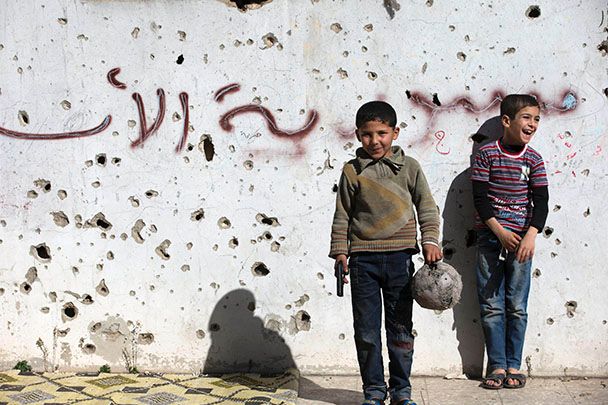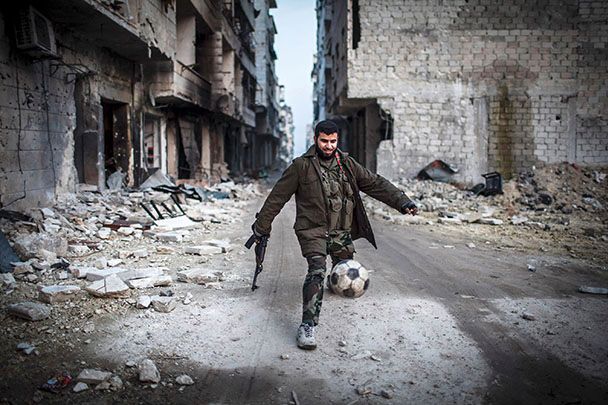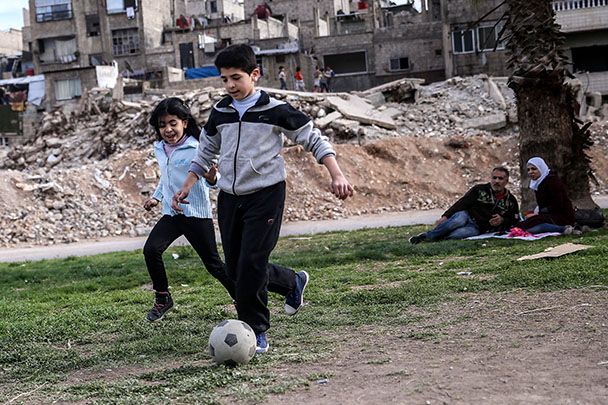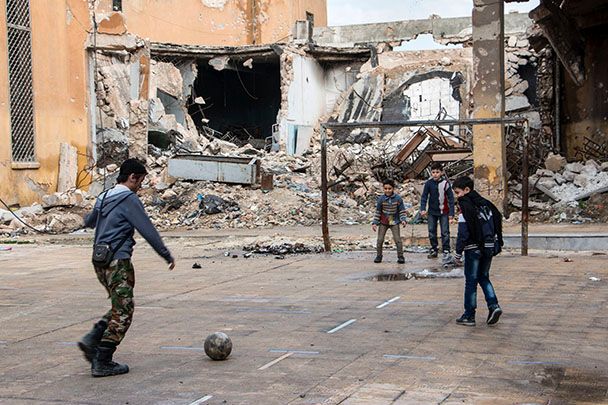The Dictator’s Team – ESPN
Karkamis Refugee Camp, Turkey
In July 2012, when Firas al-Khatib announced he would no longer play for Syria, his hometown, Homs, was in flames. The west-central city, once Syria’s third largest, is known as the “capital of the revolution.” The previous year, when peaceful protests against Assad’s authoritarian government spread across the country, thousands of Homs residents took to the streets. As he did in other cities, Assad responded with overwhelming force. The government’s response to the nationwide protests triggered a civil war that now features a bizarre cauldron of global superpowers, foreign terrorists, warlords, militias and freedom fighters.
Assad’s scorched-earth campaign in Homs included rape and starvation — some residents ate grass to survive, according to witnesses and opposition activists. Massacres were reported in which witnesses saw Assad forces round up and kill civilians.
Khatib is one of Homs’ most prominent citizens and one of Syria’s most famous athletes — a national star since his teens. He left the country in the early 2000s to play professionally in Belgium, China and, for more than a decade, Kuwait, where he broke the league’s career scoring record. Khatib used his soccer earnings to help build a street in Homs — Al Khatib Street — complete with a soccer field and a mosque that also bears the family name. Despite the millions he earned playing abroad, he always came home to represent Syria. “To play for national team, it’s 24 million watch you, 24 million support you to win,” he says.
Khatib’s boycott, announced at a rally in Kuwait City, was a blow to Assad. Draped in a sash with the revolution colors, Khatib told the screaming crowd: “Here in front of the media, I want to say that I will never play for the Syrian national team as long as there are bombs falling anywhere in Syria.”
One man lifted Khatib onto his shoulders. The crowd addressed him as Abu Hamza, an affectionate nickname meaning “Father of Hamza,” his oldest son.
“God bless you, Abu Hamza! God bless you!”
Khatib plays for Kuwait Sporting Club, his fourth team in Kuwait. Standing on the sideline of his home stadium one afternoon in February, he struggles to explain how he could think about representing Syria again, given his previous stance and the atrocities the government continues to inflict on the civilian population.
“What happened is very complicated,” he says. “I can’t talk more about these things. Sorry, sorry, I’m very sorry. Better for me, better for my country, better for my family, better for everybody if I not talk about that.”
But he offers clues.
Khatib says he has not set foot on Al Khatib Street in six years. He has not seen his father, who can’t leave the country because of illness. “It’s the hardest time in my life,” he says. “I don’t want to come back because I play for a national team or because I support a government or not support the government. I want to come back to Syria like one person from Syria. I want to see my parents finally, and my brothers.” Khatib says he still dreams of returning to Homs as president of Karama, the local team.
After Syria’s civil war broke out, forward Firas al-Khatib, right, and midfielder Abdulrazak al-Hussein parted ways. Khatib boycotted the national team while Hussein became captain. Manan Vatsyayana/AFP/Getty Images
At the time Khatib announced his boycott, many believed Assad would fall. “In that time is really good revolution — want the country grow up, the country more strong, the people want to live better,” he says. Now Assad is entrenched. The government controls not only Homs but also, as of December, Aleppo, once the most populous city. The Syrian professional league, which had been confined to two cities — Damascus and Latakia — is competing again in other parts of the country. In late January, Ittihad and Hurriyah, Aleppo’s main rivals, played their first game in the city since 2012, an event heralded by the government as a sign that Syria is returning to normal.
“I [said] I will not play until this killing, this dying, stop,” Khatib says. “Now, you ask me about why you change. I change for just a football decision, not a politics decision. We want to be happy. We want something to make us happy. Everything now in Syria makes us sad.”
He has five weeks to decide whether to join Syria for its next match. Since tying South Korea in Malaysia, the team has beaten China and tied Iran, the group leader. Syria’s first appearance in the World Cup is within reach.
Khatib is asked how he can consider representing a government that continues to bomb civilians, that tortures and murders “people you love, teammates of yours.”
“Very, very, very difficult question,” Khatib says, smiling plaintively. “I can’t talk, really. I want to talk. But I can’t.”
For other players, representing Assad is an unthinkable betrayal.
One is Firas al-Ali.
“I saw Syria as paradise on earth,” says Ali, a former defender on the national team.
But he’s no longer in Syria, and this isn’t paradise.
The Karkamis Refugee Camp resembles a low-slung prison. Perched on Turkey’s southern border with Syria, the camp is surrounded by gray walls and barbed wire and is controlled by the Turkish government. The 6,886 occupants (including 1,963 children) are free to leave, if only they had somewhere to go and the means to get there.
Ali once owned three houses. Now all his belongings are stuffed into a large white tent, one of hundreds erected symmetrically on the sun-baked earth. Ali’s tent is no bigger or smaller than his neighbors’, but inside it’s immaculate and formal. White lace curtains line the canvas walls, and an Oriental rug covers the wood foundation. Floral-patterned cushions form a U-shaped sitting area. A small silver teapot rests atop a hot plate, and there’s even a 13-inch TV and a mini fridge. Ali, 31, his wife and three children have lived at Karkamis for three years. His young daughter, Aysha, was born here.
Ali has dark hair that sweeps across his forehead and the willowy grace of a pro athlete. For close observers of Syrian soccer, his predicament is difficult to comprehend, a star athlete left to live among his fans in tent housing. Ali played for Shorta, one of the top teams in Damascus, earning $125,000 a season, a fortune in Syria. More important, he represented Syria. “From 23 million people, I was one of the 20 best players in my country,” he says. “I was famous and recognized wherever I went. My material situation was excellent. I had a good family and a good reputation. I never thought of even taking a step outside my country.”
Now he’s a refugee, his family’s needs met by the Turkish Disaster and Emergency Management Authority.
Ali says he would rather live in a refugee camp than play for Syria. In 2011, when Assad’s forces attacked Hama, his hometown, Ali’s 19-year-old cousin Abdullah, a college geography student, was shot and killed during a protest. “The bullet struck his eye and came out of his head,” Ali says. Later, a barrel bomb — a gas-filled oil drum the regime has heaved from helicopters by the thousands — fell through the roof of a house and incinerated his niece as she stood in her kitchen. Ali says he arrived a few minutes later. “To see a human being cut to pieces, it’s a nightmare,” he says. “She was almost 200 pounds; she was heavily built. We couldn’t find her.” Ali joined the protests, covering his face because he was so recognizable. He felt he was leading a double life: challenging Assad in the streets and representing him on the field.
One morning Ali showed up for practice at Abbasiyyin Stadium in Damascus and found that it had been converted into a military base. “We had half of the stadium, and the 4th Division [of the Syrian Army] had the other half. This I saw with my own eyes! There was artillery in places meant for athletes. They would go out to suppress the demonstrations from the stadium that I was practicing in. I’d hear gunfire from inside the stadium. And the demonstrators still didn’t have weapons. The only ones who carried weapons at that time were the regime.”
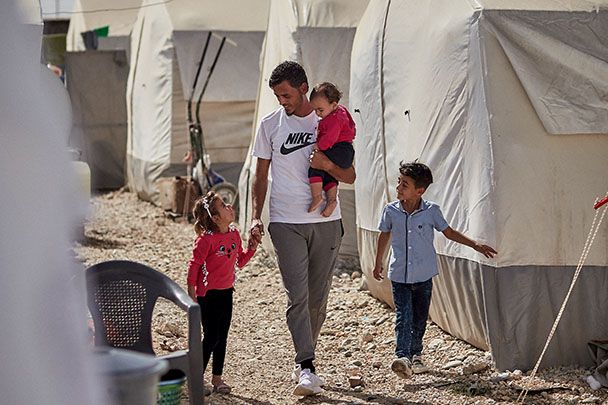
Firas al-Ali once owned three homes in Syria but now lives in a tent at the Karkamis Refugee Camp in Turkey with his wife and three children. Brian Henderson for ESPN
The national team’s head coach was Fajer Ebrahim, the Assad loyalist who later wore a T-shirt with the president’s picture before a World Cup qualifying match. Ebrahim spoke openly about the need to crush the protests, Ali says. By winning games, Ebrahim told the players, Syria would show the world that the uprising was having little effect. The players were divided: “We were destroying ourselves,” Ali says. He felt increasingly demoralized, his effort on the field diminished “because I was so distracted. Friends were dying, relatives were dying.”
Ali sometimes stayed at the Blue Tower Hotel, a four-star hotel on Hamra Street in Damascus. One sleepless night, he says, he watched in horror from his eighth-floor window as the government shelled civilian neighborhoods around the city. “It was as though I was watching an action movie on television,” he says. “It was terrifying.”
Another night, while the national team was training for a tournament in India, Ali got a call that his 13-year-old cousin, Alaa, had been killed during a government attack in a village outside Hama. Thirty minutes later, he joined the national team for dinner. When one of his teammates mocked the protesters, Ali says he hurled a spoon at him before teammates pulled them apart. Ali returned to his room and called his family.
“I’m done,” he told his sister.
“What do you mean?” she responded.
“I don’t want to play for them, ever,” he replied.
He arranged for two of his brothers to pick him up at 5:30 the following morning. From there, Ali sped off to rebel-held territories, waved through at checkpoints, he says, by soldiers who recognized him as a famous athlete but were unaware he was fleeing the regime. He crossed the border into Turkey with his young family. Ali was free, but suddenly he had new challenges. “I had money in the bank, and after I defected, the regime took it,” he says. “I had three houses, and they were destroyed. … I had a plot of land, it’s gone. … It was just like all my money went.”
As he describes his transformation, Ali sits in what passes for a mall at Karkamis: a row of plywood stalls that sells everything from food to canned goods to cookware to generators. One of the vendors brings over platters of grilled meats, and Ali ducks inside one of the stalls — a cramped hardware store — to avoid the flies that descend on the food. His days revolve around teaching soccer to children, who flock to him like a camp celebrity. In the late morning, as the sun cuts through the desert haze, Ali and three dozen kids gather on a concrete slab strewn with broken glass to stretch, run laps and scrimmage. Occasionally the ball finds its way to Ali, who manipulates it with the practiced dexterity of his former life.
“It’s hard, but I don’t regret anything at all,” he says. “How would one feel who is playing under this flag and carrying a picture of the person who is the sole reason for the killing and the death and the expulsion of more than 7 million Syrians?”

